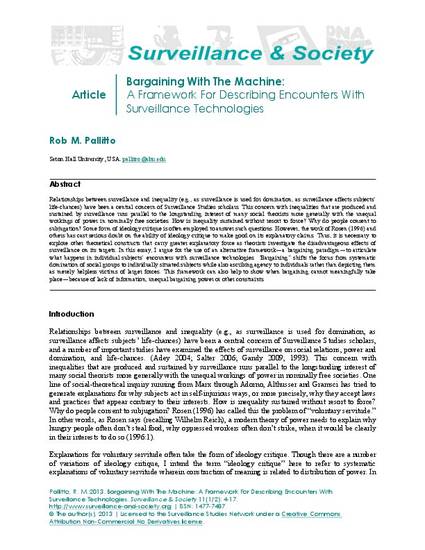
Article
Bargaining with the Machine: A Framework for Describing Encounters with Surveillance Technologies
Surveillance & Society
(2013)
Abstract
Relationships between surveillance and inequality (e.g., as surveillance is used for domination, as surveillance affects subjects’ life-chances) have been a central concern of surveillance studies scholars. This concern with inequalities that are produced and sustained by surveillance runs parallel to the longstanding interest of many social theorists more generally with the unequal workings of power in nominally free societies. How is inequality sustained without resort to force? Why do people consent to subjugation? Some form of ideology critique is often employed to answer such questions. However, the work of Rosen (1996) and others has cast serious doubt on the ability of ideology critique to make good on its explanatory claims. Thus, it is necessary to explore other theoretical constructs that carry greater explanatory force as theorists investigate the disadvantageous effects of surveillance on its targets. In this essay, I argue for the use of an alternative framework – a bargaining paradigm – to articulate what happens in individual subjects’ encounters with surveillance technologies. “Bargaining” shifts the focus from systematic domination of social groups to individually situated subjects while also ascribing agency to individuals rather than depicting them as merely helpless victims of larger forces.
Keywords
- surveillance,
- ideology critique,
- technology
Disciplines
Publication Date
2013
Citation Information
Robert M Pallitto. "Bargaining with the Machine: A Framework for Describing Encounters with Surveillance Technologies" Surveillance & Society Vol. 11 Iss. 1/2 (2013) p. 4 - 17 Available at: http://works.bepress.com/robert_pallitto/8/
